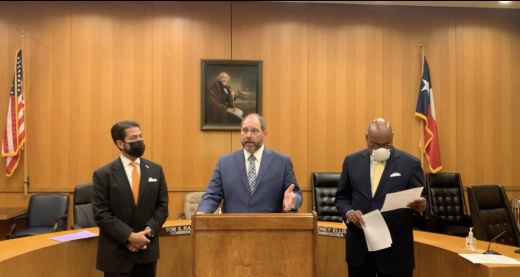The new initiative, which will be funded with roughly $8.93 million in American Rescue Plan Act dollars allocated to The Harris Center, by county commissioners, aims to address a countywide mental health crisis that county officials said has only been further exacerbated by the ongoing coronavirus pandemic.
"The mental health impact of COVID-19 has touched almost every family in this country over the last 18 months. In fact, over 40% of Americans report symptoms of anxiety or depressive disorder right now," said Wayne Young, CEO of The Harris Center, during an Oct. 26 press conference. "Prior to the pandemic, the investment in behavioral health was too limited and the behavioral health workforce was too short. More than ever, it's clear that we cannot simply create strategies and hire more clinicians to try to reduce and address these problems. We must take an innovative step forward to lessen the negative mental health impacts of this pandemic."
According to Young, the community care model will focus on 10 ZIP codes totaling about 300,000 residents that have been disproportionately affected by COVID-19 and suicide, and that have a lower utilization of behavioral health care services, by providing mental health education and training to members of the community.
"The community-initiated care model is not dependent upon licensed clinicians but instead engages in mental health promotion, prevention and low-intensity interventions delivered by nonspecialized but trained health care workers and lay members of the community," Young said. "Community-initiated care is a broadly inclusive concept of empowering individuals to learn how to respond to mental health and substance use issues, and to take helpful action in the moment, in real time. Specifically, the collective strategies will build resiliency and offer training, support and education to those communities through a menu of services and categories that focus on education and training, skill development, caring contacts, and digital impacts."
Young noted that each Harris County precinct will have at least one dedicated Health Minds, Health Communities team and coordinator, who will be tasked with providing the mental health training and education to community members.
"We're not trying to go and divide this money based on some political formula; we're going to spend this money where the problems are. So we're targeting those ZIP codes that we know have more of a problem," Precinct 1 Commissioner Rodney Ellis said during the Oct. 26 press conference. "Mental health is clearly a problem in Harris County and has been a problem for a very long time—and one that oftentimes has been overlooked. I'm proud to support this program. This is a massive investment. ... I think it is the largest investment of this type concentrated into a community-based approach. ... Academics have talked about it ... but nobody's done it. So this is one where we will be the best practice."
The designated ZIP codes include 77504, 77060 and 77033 located in Precinct 1; 77093, 77022 and 77076 located in Precinct 2; 77450 located in Precinct 3; and 77090, 77091 and 77038 located in Precinct 4.
Ellis noted that the county will have metrics in place to evaluate the program's effectiveness to determine if the county will sustain the program with local dollars after the three-year period of ARPA funding.
"The Harris Center will equip neighborhood leaders with the training and tools that they need to help save lives," Precinct 2 Commissioner Adrian Garcia said during the Oct. 26 press conference. "It will involve training in areas such as mental health first aid and skills development so that folks like barbers and hair dressers, even family members of those who have a mental illness, will have the training to become mental health advocates. It's about creating a more empathetic and resilient community."
Young added that anyone who is struggling with mental health as a result of the ongoing coronavirus pandemic should call the Texas COVID-19 mental health support line, which is staffed by the Harris Crisis Line staff 24/7, at 833-986-1919.
"We are making an important and incredible commitment to all people in Harris County," Garcia said. "It's critical; just ask anyone that you know has lost a loved one to suicide."





